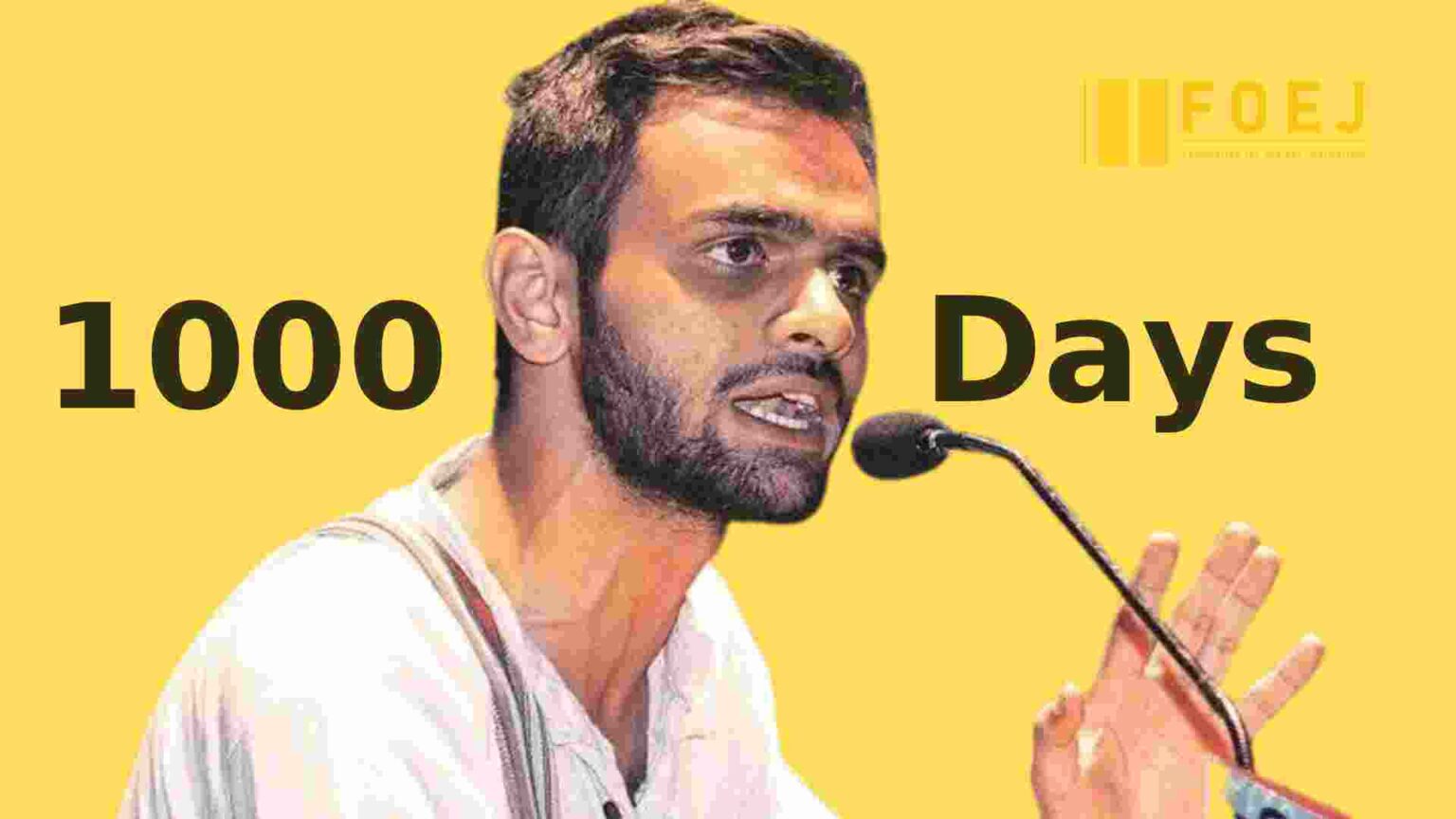The price of eternal freedom is eternal vigilance – Thomas Jefferson
Umar Khalid is an Indian student activist, who’s been in jail because of his speech which he delivered on February 17, 2020, at Amravati Maharashtra.
“We won’t respond to violence with violence. We won’t respond to hate with hate. If they spread hate, we will respond to it with love. If they thrash us with lathis, we keep holding the tricolor,” he says in his speech. Was this enough to hold someone under terrorism charges?
It was not ‘facts’ or ‘words’ used in speech, it was pride, pride of our government which was shaken by Umar’s speech and led him to jail for 1000 days.
Even Justice Mridual, the hon’ble judge of High Court orally remarked: “That speech is in bad taste, does not make it a terrorist act.”
However, Khalid is held in jail because of the stigma attached to him, the stigma of being a part of an individual community. The speech was selectively quoted by Bharatiya Janata Party leaders so they can harness their instigation of the Delhi riots on someone else.
How family history creates a social stigma?
Umar Khalid was born in Jamia Nagar, New Delhi, and has lived there for the last 30 years. His father, Syed Qasim Rasool Ilyas, is from Maharashtra, while his mother is from Western Uttar Pradesh. Khalid studied history at the Kirori Mal College of Delhi University. He later did his master’s and MPhil in history at JNU. His MPhil dissertation was on ‘Hos of Singhbhum’. Khalid’s Ph.D. thesis was titled “Contesting Claims and Contingencies of the Rule on Adivasis of Jharkhand” and was submitted to the JNU in 2018.
Umar Khalid’s family background has been a contributing factor in holding him accountable, in addition to his own actions in life. His father Sayed Qasim Rasool Ilyas was the National President of the Welfare Party of India and a former member of the Student Islamic movement, a banned Islamist Terrorist organization, which he left in 1985.
Brief on STUDENT ISLAMIC MOVEMENT OF INDIA OR SIMI
The Students Islamic Movement of India (SIMI) was banned by the Indian government in 2001 and the ban has been extended multiple times since then. The government cites reasons such as SIMI’s involvement in violent incidents, promotion of separatist activities, and indoctrination of youth with extremist ideologies. However, there is a lack of clear evidence to support the allegations that SIMI is a terrorist organization. Human Rights Organizations argue that the ban has infringed upon the right to freedom of association. While the government maintains that the ban is necessary for national security, there have been cases where individuals accused of being SIMI members were acquitted. This raises questions about the fairness of the government’s actions and whether SIMI has been unjustly targeted.
Umar Khalid, the son of Sayed Qasim Rasool Ilyas, has been unfairly associated with the stigma of involvement in terrorist activities throughout his past. Stigmas attached to an individual are not based on factual evidence but rather on unsubstantiated allegations.
Umar Khalid has now spent 1000 days in jail, a period that weighs heavily on his life and circumstances.
Cases filed against Umar Khalid
Umar Khalid, along with Kanhaiya Kumar and Anirban Bhattacharya, was charged with sedition in 2016 for allegedly raising anti-national slogans during a protest against the hanging of Afzal Guru. The case was widely criticized as politically motivated and an attack on freedom of expression.
In 2019, the Delhi High Court quashed the sedition charges, which was later upheld by the Supreme Court in 2020. The sedition case against Khalid was seen as an attempt to silence dissent and target political opponents. In 2020, Umar Khalid faced charges under the Unlawful Activities (Prevention) Act (UAPA) for his alleged involvement in the 2020 Delhi riots. Khalid has denied the charges, stating that they are politically motivated. Human rights groups and lawyers have criticized the UAPA case, arguing that it is being used to target political opponents and that the evidence against Khalid is weak.
CAA, DELHI RIOTS & BJP GOVERNMENT
The Delhi riots of 2020, which took place between 23 to 26 February, were sparked by the Citizenship Amendment Act (CAA) and resulted in the loss of numerous lives, predominantly among the Muslim community. The riots raised allegations against the ruling Bharatiya Janata Party (BJP) for their potential involvement in inciting the violence. A notable instance was a speech by BJP politician Kapil Mishra, seen as a catalyst for the subsequent unrest.
The Bhartiya Janta Party is a Hindu nationalist party, and its policies have been seen as discriminatory towards Muslims. The Citizenship Amendment Act (CAA), introduced by BJP grants citizenship to non-Muslim immigrants from Pakistan, Bangladesh, and Afghanistan who entered India before December 2014.
Illegal Detention of Umar Khalid – A Democracy’s Strain
Umar Khalid is currently facing illegal detention, which flagrantly violates his fundamental rights. Being held without charge or trial, this constitutes a blatant case of arbitrary detention, which is strictly prohibited under international law. The Indian government lacks any justifiable grounds for detaining Umar Khalid.
On his 1000th day of illegal detention, people are supporting him without any hesitation or fear on social media. This support and plea give a broad idea of how people are standing against the government and the injustice faced by Umar Khalid.
These 1000 days are the darkest pages in the history of this ‘democratic nation’.
The propaganda against a person from a particular religion, who was fighting for the cause of Muslim rights clearly shows that we have not learned anything from the history, where democratic regimes devolved into authoritative ones, firmly established through similar means.









